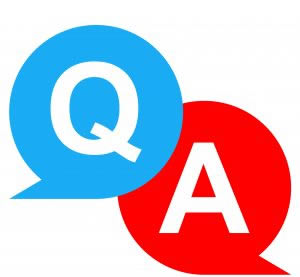   

SEND US YOUR COMMENTS HERE. 
Read Me First. 
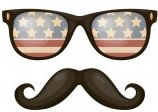 ALL TOO COMMON TESTIMONIALS ALL TOO COMMON TESTIMONIALS 
A consumer recently reported their experience
whereby they were handed their new eyeglasses at a large retail
optical store by a Dispenser (not an Optician) with some 20
years of experience, whereupon no adjustments to the frame
were made and the Patient was forced to seek the appropriate
service elsewhere. The Patient subsequently reported that
she felt fortunate to find an Independent Optician like us, having
the skills to relieve her discomfort, after spending a considerable
amount of time searching. (Question: Is there a difference
anymore between buying prescription eyewear in a brick-and-mortar store and buying online? See GlassesOnlineWarning.com.)
 Here's a note from a frustrated consumer looking for a skilled Optician. She contacted us by phone for a referral. We sent her several names of Opticians that were recommended by Opticians whom we contacted. Here's a note from a frustrated consumer looking for a skilled Optician. She contacted us by phone for a referral. We sent her several names of Opticians that were recommended by Opticians whom we contacted.
 Dear Mr. Bird, Dear Mr. Bird,
Thank you so much for the effort you have made on my behalf. I am encouraged to hear of the possibility for assistance in my local area and while the Optician in Fairfield to whom you referred is not out of the question, the central Connecticut location is truly more convenient for purposes of driving and fittings so I will investigate and let you know how things go. Right now I'm actually recovering (I hope) from some infection, which seemed to begin in my eyes, and so I'll hold off until completely cleared.
I really appreciate what you have done as truly it is difficult to know who to start with and I think that it would be difficult for me to have gotten a recommendation directly as a Patient. I'll contact my Ophthalmologist to get my current prescription and eye history and let her know I've avoided getting reading and computer glasses, even though I really need them because truly the current glasses (progressives) have never been comfortable. My prescription for walking around and driving has been acceptable but they never have been fit to accommodate reading. I understand what you explained about trifocals and bifocals and I understand that these might be better compared to progressive lenses.
I guess I'm looking for improvement at least in the fit of my glasses and I won't be expecting one pair of glasses to do everything. So, finding a professional who can work with me toward more comfort as my eyes change with age really will be a great improvement.
 Here's a recent e-mail from a long time Patient, now living out-of-state. Here's a recent e-mail from a long time Patient, now living out-of-state.
 Having
you fit my glasses on my face, ears, nose and under my turban with care and attention to detail, making minute but
essential adjustments, was the best experience I have ever had
of having glasses fitted to my face during my lifetime of wearing
glasses. The first time you did my glasses, and your wife suggested
to me that I also have my lenses tinted to gently soften the
lines around my eyes, was a memorable experience. I have
shared the story of that day, in your Optical Shop very often,
whenever I get ‘new’ glasses. Most Opticians
are surprised to hear the story and also amazed that having
that care and attention to detail as a part of having glasses
fit properly made such a difference in my life. Having my glasses
not hurt, and having them fit properly was an incredible blessing.
Having my glasses fit gracefully and painlessly under my
turban was nothing short of a Godsend. I can honestly say
that no other Optician ever did such an impeccable job as you
did. Having
you fit my glasses on my face, ears, nose and under my turban with care and attention to detail, making minute but
essential adjustments, was the best experience I have ever had
of having glasses fitted to my face during my lifetime of wearing
glasses. The first time you did my glasses, and your wife suggested
to me that I also have my lenses tinted to gently soften the
lines around my eyes, was a memorable experience. I have
shared the story of that day, in your Optical Shop very often,
whenever I get ‘new’ glasses. Most Opticians
are surprised to hear the story and also amazed that having
that care and attention to detail as a part of having glasses
fit properly made such a difference in my life. Having my glasses
not hurt, and having them fit properly was an incredible blessing.
Having my glasses fit gracefully and painlessly under my
turban was nothing short of a Godsend. I can honestly say
that no other Optician ever did such an impeccable job as you
did.
 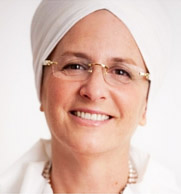  
Sikhs wearing turban over their eyewear require a customized fitting of frame
I once tried to get new lenses in the glasses that you had adjusted
for me. I came back to pick up the glasses and someone said
to me that the Optician had straightened out the bent side pieces!
I was so upset! I made the Optician come out and I explained
what you had done for me, why you had done it and what a terrible
disservice he had done by ‘straightening’ my side
pieces and that he had to re-bend the side pieces back to where
they had been. Needless to say, those glasses never fit the
same again! After that I never changed lenses without speaking
directly to the person making the lenses and making sure they
knew not to change or adjust the side pieces. If you lived where
I could get my glasses adjusted properly that is where I would
go...
 A
consumer who found our Web site. A
consumer who found our Web site.
 Sir, I salute you! I quite agree about the loss of experience
in fitting eye wear to client. I currently don't know a qualified
Optician, one who carefully fits the frame to the head. I'm
currently working on adjusting my new pair of glasses. It's
an on-going project. I'd pay just for the professional fitting.
In time, I may review both your sales and your fitting courses. Sir, I salute you! I quite agree about the loss of experience
in fitting eye wear to client. I currently don't know a qualified
Optician, one who carefully fits the frame to the head. I'm
currently working on adjusting my new pair of glasses. It's
an on-going project. I'd pay just for the professional fitting.
In time, I may review both your sales and your fitting courses.
 A
recent e-mail from a Massachusetts friend upon visiting our
Web site. A
recent e-mail from a Massachusetts friend upon visiting our
Web site.
 I was 9 (*cough,cough!* an eon ago!) - I can't remember
actually being "fitted" with my glasses in years and
years. Thank you for this reminder that it SHOULD be done this
way. Perhaps if dispensaries had continued these practices
I wouldn't have felt so aggrieved at the continually and gasp-inducing
rising prices of eyewear. To such an extent, in fact, that the
last pairs of glasses I've gotten, I
purchased online. (Hope you were sitting down for that!
I wouldn't want to be the cause of a heart attack :-) ) No,
I didn't get fitted, obviously, but I got exactly the same product
- AND service - I would have gotten at any local shop, for so
much less money that I was able to buy three pairs of glasses
for about a third of the price I'd have paid in person. Anyway,
thanks for sharing this. I was 9 (*cough,cough!* an eon ago!) - I can't remember
actually being "fitted" with my glasses in years and
years. Thank you for this reminder that it SHOULD be done this
way. Perhaps if dispensaries had continued these practices
I wouldn't have felt so aggrieved at the continually and gasp-inducing
rising prices of eyewear. To such an extent, in fact, that the
last pairs of glasses I've gotten, I
purchased online. (Hope you were sitting down for that!
I wouldn't want to be the cause of a heart attack :-) ) No,
I didn't get fitted, obviously, but I got exactly the same product
- AND service - I would have gotten at any local shop, for so
much less money that I was able to buy three pairs of glasses
for about a third of the price I'd have paid in person. Anyway,
thanks for sharing this.
 My six 'sense'. So,
this consumer's experience suggests the reason for the proliferation
of online prescription eyewear sales is not so much about lower
prices as it is about adequate personalized, handcrafted, hands on the Patient
services. There
are only three things the optical industry can offer the prescription
eyewear consumer, SERVICE, QUALITY and PRICE. But most latter-years
dispensaries currently ever offer ONLY TWO of these, simultaneously. My six 'sense'. So,
this consumer's experience suggests the reason for the proliferation
of online prescription eyewear sales is not so much about lower
prices as it is about adequate personalized, handcrafted, hands on the Patient
services. There
are only three things the optical industry can offer the prescription
eyewear consumer, SERVICE, QUALITY and PRICE. But most latter-years
dispensaries currently ever offer ONLY TWO of these, simultaneously.
Why can’t we offer SERVICE, i.e.,
1) HANDS-ON THREE DIMENSIONAL DISPENSING;
2) QUALITY PRODUCTS;
3) FAIR PRICING. All three
simultaneously, like we used to do?
Speaking of Price...
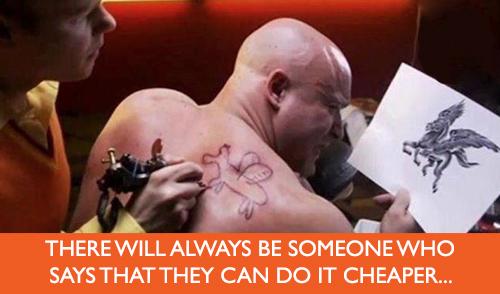
This leaves online
providers only with their cheaper prices and no custom fitting skills
for that segment of the market, and leaves the remaining
market (we’re talking mostly about full-time prescription-wearing
consumers, not those looking for plano sunwear or readers) to Eyewear Professionals. A big challenge now, is that the industry
has devolved to the point of being extremely short on Multi-Dimensional Dispensing
Technicians. See Shift Happens.
BTW:
A colleague recently asked...
 What does it say about the "soul" of our profession
when the first "selling point" that comes out of a
frame rep's mouth is, "Your cost is $9.95, but it's listed
in Frame Facts for $79.95...so you can bill insurance higher? -- See ServingVersusSelling.com. What does it say about the "soul" of our profession
when the first "selling point" that comes out of a
frame rep's mouth is, "Your cost is $9.95, but it's listed
in Frame Facts for $79.95...so you can bill insurance higher? -- See ServingVersusSelling.com.
 From
a fellow Optician: From
a fellow Optician:
 Coming
from the old-fashioned world of Opticianry, it really saddens me
that today is all about the sales. Gone are the days of one
on one, fitting and guiding the patients through the process.
I have even come across people who never even knew they were
wearing progressives!! This is totally outrageous. They tell
me they were told they will now be able to see up close with
their new glasses but never explained what they were getting.
This has happened more than once. I can see why the visitor to your site felt no difference buying
online rather than at a brick and mortar location. It angers me that the
word "fitting" is not even recognizable to him. As Opticians,
we need to man up and go back to basics before the Internet
takes over what we are trained to do. Thanks for the eye opening. I will take it as a encouragement
to keep doing my old fashion fitting and dispensing and hope
it does make a difference. Coming
from the old-fashioned world of Opticianry, it really saddens me
that today is all about the sales. Gone are the days of one
on one, fitting and guiding the patients through the process.
I have even come across people who never even knew they were
wearing progressives!! This is totally outrageous. They tell
me they were told they will now be able to see up close with
their new glasses but never explained what they were getting.
This has happened more than once. I can see why the visitor to your site felt no difference buying
online rather than at a brick and mortar location. It angers me that the
word "fitting" is not even recognizable to him. As Opticians,
we need to man up and go back to basics before the Internet
takes over what we are trained to do. Thanks for the eye opening. I will take it as a encouragement
to keep doing my old fashion fitting and dispensing and hope
it does make a difference.

  

 Currently 8 percent of all US retail sales are made on the Internet, Currently 8 percent of all US retail sales are made on the Internet,
a market share that is increasing rapidly. The rising penetration of
smartphones and tablet computers will only accelerate the trend.
Across every consumer product category, the Internet is bringing
a greater pricing transparency. The recent upsurge in activity by
low–cost, Internet–based eyewear retailers raises the specter of
significant revenue loss for independents. In a recent study 16
percent of patients surveyed indicate they use the Internet
during some phase of their eyewear purchase process.
See The reason some folks buy their glasses online.
 My six 'sense'. My six 'sense'.
Any ophthalmic dispenser who is not practicing basic dispensing guidelines as described here is a mere eyeglass merchant, not an Optician. And this is the
major reason why many of today's PRESCRIPTION eyewear consumers
purchase their eyewear online.
If
you are not practicing Opticianry with the application of 3D
Dispensing, Discovery-Design-Delivery, skills, i.e., 1)
DISCOVERY of the consumers real eyewear needs in an unbiased Comprehensive Lifestyle Interview, 2) user friendly DESIGN of the eyewear, and 3) Touch and Feel, Hands on the Consumer
DELIVERY of the eyewear, let’s be honest, you
are a big part of today’s proliferation of
online sales. And only you can restore market share to the
industry, more skillful professional services for consumers,
and the lost art of handcrafted form-fitting skills to this profession.
To this point,
we recommend charging
Web-based consumers realistic across-the-board-fees for follow-up servicing of ill-fitting
eyewear. (This is addressed in some detail here.)
Of course, we must see to it that we have the handcrafting skills
that warrant charging these fees. Opticians have historically offered free
lifetime service, but with the advent of online eyeglass merchants, free lifetime
services can only be realistically offered to full-fee consumers.
Again, we must have the hands on the patient handcrafting skills in order to warrant the fees.
Unfortunately, for most latter-day Opticians, even many senior Opticians, this could
pose a real challenge. See Facial Asymmetry.
Where
there is NO DIFFERENCE between the service offerings of a brick-and-mortar
merchant and an online vendor, other than price, many consumers
understandably choose the online source. They
are 7/24 accessible, cheaper, and offer the same absence of
direct human contact as many of today’s dispensaries.
What’s not to like? And keep in mind that 7-11 stores
are successful even though their prices are higher. Why? Because
consumers mostly get the Service and Quality they want.
 NOTE: NOTE: Lots of prescription glasses are being purchased online, but is it really a great value? What about Rx accuracy, FREE lifetime service on frame adjustments, and where do Lots of prescription glasses are being purchased online, but is it really a great value? What about Rx accuracy, FREE lifetime service on frame adjustments, and where do
consumers go to get their lenses replaced, frame realignments or routine repairs?
When you visit your Optician, they inquire as to where you bought your glasses, and then inform you that there will be a twenty-five dollar fee ($25.00) to adjust any glasses not purchased there, and furthermore, they will not be responsible if something were to break because they did not sell them to you. You are angry because they have never charged you before to adjust your glasses and you demand an explanation. The Optician patiently informs you that unlike most other items you purchase, the price you pay for glasses purchased from an Optician have a lifetime of service built into the cost.
Have you ever bought a set of tires for your car, and been able to return to the dealer as often as you wish for free alignments? No, but if you could, the tires would be more expensive because the dealer would have to factor in the additional service costs over the life of the tires, plus salaries, inventory and overhead, for all of the ‘free work’ they provide. Source. Source.

  
According to the Wall Street Journal, McDonald's franchisees
are taking several actions to improve service, including adding staff
at peak hours and trying a new system to take orders. Surveys show that
customers consider customer service as important as price, The Journal noted.
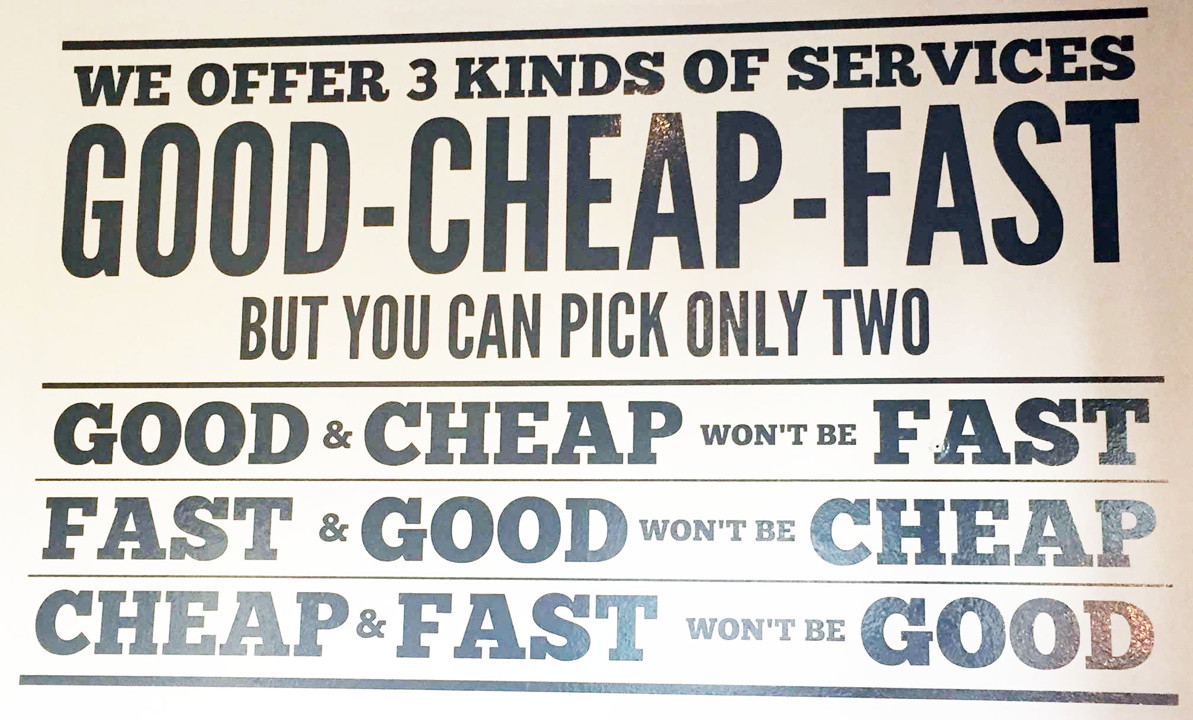
 My six 'sense'. There
are only three things the optical industry can offer the prescription
eyewear consumer, SERVICE, QUALITY and PRICE. But most latter-years
dispensaries currently ever offer ONLY TWO of these, simultaneously.
Why can’t we offer SERVICE, i.e., 1) HANDS-ON THREE DIMENSION DISPENSING, 2) QUALITY PRODUCTS, and 3) FAIR PRICING, all three
simultaneously, like we used to do? This leaves the online
providers with only their cheaper prices with no custom fitting skills
for that segment of the market, and leave the remaining
market (we’re talking mostly about full-time-wear prescription-wearing
consumers, not those looking for plano sunwear or readers) to Eyewear Professionals. A big challenge now, is that the industry
has devolved to the point of being extremely short on Multi-Dimensional Dispensing
Technicians. My six 'sense'. There
are only three things the optical industry can offer the prescription
eyewear consumer, SERVICE, QUALITY and PRICE. But most latter-years
dispensaries currently ever offer ONLY TWO of these, simultaneously.
Why can’t we offer SERVICE, i.e., 1) HANDS-ON THREE DIMENSION DISPENSING, 2) QUALITY PRODUCTS, and 3) FAIR PRICING, all three
simultaneously, like we used to do? This leaves the online
providers with only their cheaper prices with no custom fitting skills
for that segment of the market, and leave the remaining
market (we’re talking mostly about full-time-wear prescription-wearing
consumers, not those looking for plano sunwear or readers) to Eyewear Professionals. A big challenge now, is that the industry
has devolved to the point of being extremely short on Multi-Dimensional Dispensing
Technicians.
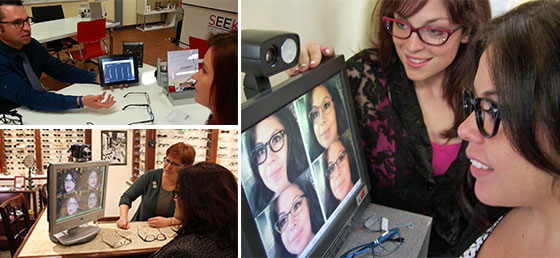
The
majority of prescription eyewear consumers relates to and seeks
customized Discovery, Design, Delivery, and Quality Products
IF and WHEN these are available. What created the online merchant-sellers
is that Multi-Dimensional Dispensing skills are more the exception
than the rule. We have personally served consumers in recent years that
were literally shocked to experience a tactile, hands-on, touch
and feel, handcrafted frame fitting, having never seen nor experienced such
service. Sad! -- See GlassesOnlineWarning.com.
 From
another Optician: From
another Optician:
 Hari, thank you for helping those that haven't yet figured out this lost art. Once a week I will get somebody in my shop, complaining of their eyewear just not feeling right. I cringe when I see optics up around their eyebrows, pads off kilter, and temples that look like their made to fit a watermelon. Thanks for leading this crusade. Best of luck. Hari, thank you for helping those that haven't yet figured out this lost art. Once a week I will get somebody in my shop, complaining of their eyewear just not feeling right. I cringe when I see optics up around their eyebrows, pads off kilter, and temples that look like their made to fit a watermelon. Thanks for leading this crusade. Best of luck.
 My six 'sense'. My six 'sense'.
Thank you for your feedback! Here are some additional thoughts i can share.
If State Boards would give this issue some attention, I think some significant change could occur. I think we must start at the top as well as the bottom in order to turn things around.
State Boards and other industry leaders need to prohibit eyeglass merchant chains from hiring and then PROHIBITING skilled Opticians from dispensing eyewear. At one point I found myself employed in just such circumstances. The national chain hired my license only in order to operate lawfully, and then assigned/restricted me to their lab where I had to endure witnessing young and unskilled sales people dispensing eyewear, some of whom simply handed over new eyewear to consumers and then asked them to bend over in order to see if the eyewear fit well. I also witnessed the frequent 4-pointing of eyewear, a pointless procedure at the dispensing table, which indicated the extremely unskilled status of their unlicensed sales staff. Of course, having only one licensed Optician on the premises at any one time allowed management to employ cheaper entry level albeit incompetent labor. Needless to say, I terminated my employment in fairly short order after vocally expressing my concern and dissatisfaction at the delivery of eyewear with such incompetence. These are the kinds of practices that have caused the steep and steady decline and the dehumanization of Opticianry, and it's the major reason why consumers are abandoning ophthalmic dispensaries in favor of Web providers. When consumers can get their unfitted eyewear more conveniently and more cheaply from their mailbox, why should they patronize a brick and mortar store for the same incompetent service, where nobody ever lays a hand on them in order to fit their eyewear? -- See OpticianryToday.com.
 Another Optician: Another Optician:
 I
agree with every word of this! Fitting glasses has become a
"Lost Art" in our profession. It seems that most New
Opticians believe the correct way to adjust glasses is to bend
the temples at a sharp right angle at an approximate location
of the back of the ear and tell the patient to "have a
nice (though somewhat painful) life." No attention is being
paid to pantoscopic or retroscopic tilt, proper nose pad adjustment
or widening temples on the smaller frames that people (for fashion
reasons) insist on buying. Keep on pushing for more fitting
classes in CEC fulfillment. -- See ReachOutAndTouchSomebody.com. I
agree with every word of this! Fitting glasses has become a
"Lost Art" in our profession. It seems that most New
Opticians believe the correct way to adjust glasses is to bend
the temples at a sharp right angle at an approximate location
of the back of the ear and tell the patient to "have a
nice (though somewhat painful) life." No attention is being
paid to pantoscopic or retroscopic tilt, proper nose pad adjustment
or widening temples on the smaller frames that people (for fashion
reasons) insist on buying. Keep on pushing for more fitting
classes in CEC fulfillment. -- See ReachOutAndTouchSomebody.com.
 From an Optician re Certification: From an Optician re Certification:
 My state is in need of change, as well. One can obtain a job in a dispensary and not even have Certification. I am so disgusted. I still attend all the CE classes every year, but I refuse to renew due to the fact that the certificate is not worth the paper it's printed on. This is not a licensed state, certification only. I happen to be employed by a practice that collectively knows everything there is to know about optics. We take pride in this and we value our patients. We take the time to educate them, which promotes word of mouth referrals. But we are a dying breed. One day we will all retire and have to close down because trying to hire a true optician is like looking for a needle in a hay stack. My state is in need of change, as well. One can obtain a job in a dispensary and not even have Certification. I am so disgusted. I still attend all the CE classes every year, but I refuse to renew due to the fact that the certificate is not worth the paper it's printed on. This is not a licensed state, certification only. I happen to be employed by a practice that collectively knows everything there is to know about optics. We take pride in this and we value our patients. We take the time to educate them, which promotes word of mouth referrals. But we are a dying breed. One day we will all retire and have to close down because trying to hire a true optician is like looking for a needle in a hay stack.
 My six 'sense'. My six 'sense'.
Over the past 58 years that I have been an Optician I've seen many forces at work in the prescription ophthalmic market. A big contributor to where we are now is the professional territorial factor. There are those in this industry who have shortsightedly worked to diminish the role of the Optician. Now to the regret of the today's entire prescription eyewear market these same entities are whining about the fact that consumers are leaving them for the Internet. (Who can blame the consumer?)
You can't have it both ways. Opticians can't remain unlicensed and uncertified, thereby insufficiently trained in the science and craft, and cast as simple eyeglass merchants on one hand, but be expected to perform at the level of skilled healthcare providers on the other. Since the majority of eyewear is dispensed by those assuming at the very least the role of the 'optician' the optical industry must collectively stop casting Opticians as anything less than respectively skilled partners along with the other Os.
Only then can the dispensing of prescription eyewear regain the humanized professionalism and market footing it had when I began my career.
BTW: I spent several years in a medical/ophthalmic office working alongside two Ophthalmologists and an Optometrist, some of the most fulfilling years of my career. Fulfilling because I saw patients served with the very best of eye healthcare services. Each of the Os practiced their respective expertise, and the patients received the most excellent of care.
And again, I do not see Opticianry advancing to where many industry leaders want to go until we return to serving people instead of serving numbers.
"Opticians are Eyewear Professionals. Opticianry is ultimately defined by how well the eyewear makes contact with the Patient, not by the number of Customers served. Service is an intrinsic value, not a value to be added. Opticians need to be service-to-Patient driven, not sales-to-Customer driven. When service comes first, sales inevitably follow." OpticiansForChange.com
 Two Opticians re the Certification of Opticians: Two Opticians re the Certification of Opticians:
 Not all states have licensing requirements. But at least with a Certified Optician, the patient is reasonably assured that the person who is helping them with a very personal, very technical and medically ordered item has some idea of how it is supposed to work. Becoming Certified is not all that hard but it does assure minimal education requirements have been met. Not all states have licensing requirements. But at least with a Certified Optician, the patient is reasonably assured that the person who is helping them with a very personal, very technical and medically ordered item has some idea of how it is supposed to work. Becoming Certified is not all that hard but it does assure minimal education requirements have been met.
If a haircut goes bad, it can grow out. If a massage goes bad...but not too badly as to cause injury, its a bad experience. If a pair of spectacles do not work correctly and you are driving, not only are you at risk so is the rest of the people on the road with you. Opticians must be certified, preferably licensed, to protect all of us from those who wear inaccurately produced or adjusted glasses.
And
 I like that comment. I think that ABO Certification should be a minimum mandatory requirement in every state. Consumers move around nowadays and when they move from a state that has no requirements to a licensed state, it's quite a shock for them. Florida is a tourism state, so we get a lot of vacationers coming in with eyecare needs. They get upset when we cannot fulfill certain requests here. Back home, they get away with a lot more, because there is no minimum certification. Not to say the people there are incompetent; they simply do not know, because they were not required to complete education at national standards. Also as you stated, the renewal hours are not that hard to obtain. There are so many professional magazines with CE hours in them, simply by reading the article and filling out a simple questionnaire. Most professional Internet sites have CE hours online. I like that comment. I think that ABO Certification should be a minimum mandatory requirement in every state. Consumers move around nowadays and when they move from a state that has no requirements to a licensed state, it's quite a shock for them. Florida is a tourism state, so we get a lot of vacationers coming in with eyecare needs. They get upset when we cannot fulfill certain requests here. Back home, they get away with a lot more, because there is no minimum certification. Not to say the people there are incompetent; they simply do not know, because they were not required to complete education at national standards. Also as you stated, the renewal hours are not that hard to obtain. There are so many professional magazines with CE hours in them, simply by reading the article and filling out a simple questionnaire. Most professional Internet sites have CE hours online.
 My six 'sense'. My six 'sense'.
I agree with the previous comments re Certification. However, certification, though important, is not the primary issue for today's Opticians. The primary issue is the absence of 'time in place' or 'residency training' in the handcrafting of eyewear directly on the Patient for the purpose of the visual comfort and full-time wearability of their eyewear. And this deficiency, more than any other factor has led to the proliferation of prescription ophthalmic sales on the Internet.
Point to Ponder
"There's been too much emphasis for decades on lectures and seminars."


There's been too much emphasis for decades on lectures and seminars, i.e., virtual training, and nowhere near adequate time spent, even for many senior Opticians, in the practical art form and science of handcrafting and fitting eyewear directly on the Patient, along with the associated training in the proper use of hand tools.
Examples: Temples must be handcrafted to follow the contours of the skull in order to avoid direct contact with the ears, while resting evenly against the skull with minimum pressure, whereby the temples act to hold the eyewear comfortably in place with all gaps and space removed while simultaneously making full and caressing-without-pressing, form-fitting contact with the skull, NOT THE EARS.
And then there is the issue of taking into account physical anomalies, i.e., the disparate cranial and facial features that all Patients present to some greater or lesser degree, that are ignored by many virtually trained, even experienced Opticians.
This, what I call 'Hands on the Patient Handcrafted Eyewear' training, is absent in the experience of so many Opticianry applicants in Florida that the Florida Board of Opticianry has now adopted a rule requiring all applicants to attend a 2 hour minimum, handcrafted, hands on the Patient Frame Fitting workshop before licensure can occur.
So, with or without Certification, "Opticianry is ultimately defined by how well the eyewear makes contact with the Patient, not by the number of Customers served." For the truly skilled Optician, the standard of care must always include customized design and handcrafted fitting of eyewear.
If you're interested in more on this subject, I urge you to visit OpticalCourse.com, DispensingGuidelines.com and OpticalWorkshops.com for photos and additional points of interest.
 From another Optician concerning big optical corporations: From another Optician concerning big optical corporations:
 We, as Opticians, need to reduce reliance on buying products from Big Optical giants such as Luxottica. Personally I stopped dealing with them years ago out of frustration with the high costs of the branded eye wear and extremely poor service (in my case anyway...waiting up to 6 months for a full order to come in). We also need to think about why it is that the public values our skills so little? -- See Sticker Shock Specs on '60 Minutes'. We, as Opticians, need to reduce reliance on buying products from Big Optical giants such as Luxottica. Personally I stopped dealing with them years ago out of frustration with the high costs of the branded eye wear and extremely poor service (in my case anyway...waiting up to 6 months for a full order to come in). We also need to think about why it is that the public values our skills so little? -- See Sticker Shock Specs on '60 Minutes'.
 My six 'sense'. My six 'sense'.
The absence of customized, personalized, handcrafted, hands on the Patient, eyewear fitting, which is practiced by too few of today's Opticians is the reason you're seeing the emergence of corporate behemoths like Luxottica.
What happened over the last 55 years is that our markup used to cover our frames-lenses-lab costs, PLUS our professional service fees, including in-depth lifestyle interview; Optician-assisted frame-lens design and selection; HANDCRAFTED, hands on the Patient delivery of eyewear; and free lifetime adjustment and minor repair services.
And while organized Opticianry, what there was of it at the time including the Guild, were fast asleep along with the other two Os, corporate interests seized on the marketing of fashion-only, unrelated-to-vision-healthcare, merchandi$ing aspects of the industry. Bigger and bigger corporate interests began promoting the selling of merchandise-only, i.e., minus most or all of the all-important vision care services. They pocketed the margins that we used to receive for our professional services, i.e., in-depth lifestyle interview; Optician-assisted frame-lens design and selection; HANDCRAFTED, hands on the Patient delivery of eyewear; and free lifetime adjustment and minor repair services. (What a ripe $ plum!)
The downward spiral continued because larger and larger corporations, with bottom-line only considerations, would hire entry level only sales clerks to dispense their merchandise, while lowering their costs. With these actions coporations began replacing experienced Opticians, i.e., skilled Eyewear Healthcare Professionals, whereby they pocketed the margins that Opticians historically made as their income. Now, we have the phased and rapid movement of the industry into the Internet. (For me, this is deja vu all over, again! Nice effective corporate strategy, huh?)
My point is that we have met the enemy and the enemy is us! The 3 O's have COLLECTIVELY created this market by becoming apathetic and by not taking care of business, i.e., the Patient always comes first. We lost our groove. We got too focused on things other than our primary mission, which is to serve the public, not to make lots of money. Not that making a good living is wrong, but that our mission of service must come first, and our income comes second. THIS IS OUR GROOVE. We got it backwards, and lost our groove.
Now we face a long, painful road, but very simple truth, to get our groove back. It all starts with making the Patient king; in-depth lifestyle interview; Optician-assisted frame-lens design and selection; HANDCRAFTED, hands on the Patient delivery of eyewear; and free lifetime adjustment and minor repair services. Stay tuned. See DispensingGuidelines.com. See OpticianryToday.com.
 From an Opticianry student: From an Opticianry student:
 I am perplexed by the animosity between opticians in licensed vs. unlicensed states. Regardless of how each of us became an optician, we are all using that same designation. Regardless of what our states require of us, we are all using that designation. So if we are all going to continue using that designation, don't you think we ought to be able to agree on what an optician is, and what we do? Along that line, we also need to be able to guarantee to our patients that we ALL have at least a certain amount of knowledge regarding optics, lens types, etc., and that we are trying to keep up with the ever-changing technology by continuing education in our field. The lack of continuity across state lines, and the mentality that if it gets me nothing financially, I shouldn't sit for unrequired boards, is crippling our profession. I am a 41 year old recent graduate of a Virginia Community College's Opticianry program. I have interned for the last year at a large retail chain and also at an independent optical shop that has been in business for 33 years. Virginia is a licensed state, and I have taken my written ABO and NCLE, and will be sitting for my state's practical for my license in 20 days. Not because it will help me get a better job with better pay, but because I want to be a great optician. I do not have a job lined up. But that isn't keeping me from taking these exams, nor is it keeping me from attending any symposium, leadership conference, or seizing any opportunity that comes along to make me a better optician. Because my patients that I WILL serve deserve that. I am excited every day to learn more, help more, and do more. I want to learn. I want to be part of a group of professionals who take an immense amount of pride in their ability to provide patients with the best vision possible. I want to elevate the field of opticianry, promote our value to the public, and be a part of a respected industry. I think these goals are pretty common to most of us. We need to come together and work toward a common goal. There is power in numbers. Together, we can change the path of our profession. We should strive for excellence. Quit tearing each other down, quit making excuses, quit being lazy and complacent. Work together to provide great service and make our slice of the pie just as important as the other 2 "Os"- in the eyes of the public. We are all necessary in the eye care environment, and it is our duty to educate, provide outstanding service, and raise the bar! I am perplexed by the animosity between opticians in licensed vs. unlicensed states. Regardless of how each of us became an optician, we are all using that same designation. Regardless of what our states require of us, we are all using that designation. So if we are all going to continue using that designation, don't you think we ought to be able to agree on what an optician is, and what we do? Along that line, we also need to be able to guarantee to our patients that we ALL have at least a certain amount of knowledge regarding optics, lens types, etc., and that we are trying to keep up with the ever-changing technology by continuing education in our field. The lack of continuity across state lines, and the mentality that if it gets me nothing financially, I shouldn't sit for unrequired boards, is crippling our profession. I am a 41 year old recent graduate of a Virginia Community College's Opticianry program. I have interned for the last year at a large retail chain and also at an independent optical shop that has been in business for 33 years. Virginia is a licensed state, and I have taken my written ABO and NCLE, and will be sitting for my state's practical for my license in 20 days. Not because it will help me get a better job with better pay, but because I want to be a great optician. I do not have a job lined up. But that isn't keeping me from taking these exams, nor is it keeping me from attending any symposium, leadership conference, or seizing any opportunity that comes along to make me a better optician. Because my patients that I WILL serve deserve that. I am excited every day to learn more, help more, and do more. I want to learn. I want to be part of a group of professionals who take an immense amount of pride in their ability to provide patients with the best vision possible. I want to elevate the field of opticianry, promote our value to the public, and be a part of a respected industry. I think these goals are pretty common to most of us. We need to come together and work toward a common goal. There is power in numbers. Together, we can change the path of our profession. We should strive for excellence. Quit tearing each other down, quit making excuses, quit being lazy and complacent. Work together to provide great service and make our slice of the pie just as important as the other 2 "Os"- in the eyes of the public. We are all necessary in the eye care environment, and it is our duty to educate, provide outstanding service, and raise the bar!
 My six 'sense'. My six 'sense'.
Here, here! Thank you for your optimism and enthusiastic expressions! I want to hear from you again, after you've been working in this profession for a couple of years.
"Opticianry is ultimately defined by how well the eyewear makes contact with the Patient, not by the number of customers served."
Use this as your guide and follow the guidelines as described at Dispensing Guidelines.
And do not let anybody or any employer/corporation steer you away for any reason.
 From
another Optician: From
another Optician:
 I really think that it is important for Ophthalmologists and Optometrists to support our field in anyway they can, because if we should disappear, the Optometrists are next. It is important that Optometrists make sure that the company they work for or if they are independent, hire LDO's to work in their optical shop or lab section of their office. I am from Washington State which requires Opticians be licensed. I really think that it is important for Ophthalmologists and Optometrists to support our field in anyway they can, because if we should disappear, the Optometrists are next. It is important that Optometrists make sure that the company they work for or if they are independent, hire LDO's to work in their optical shop or lab section of their office. I am from Washington State which requires Opticians be licensed.
 My six 'sense'. My six 'sense'.
Speaking of Ophthalmologists and Optometrists, would it not be helpful to get them to enter a corrected VA (Visual Acuity) value on all their Rx's? Can you imagine trying to design eyewear without this important data? Can you imagine the time and effort this action would save for all parties?
 An Optician's
follow up response to our comment: An Optician's
follow up response to our comment:
 Indeed it would. If you had that information, as well as any other relating to acuity, it would save a lot of aggravation for both parties. That used to be a pretty standard thing 30 years ago. Indeed it would. If you had that information, as well as any other relating to acuity, it would save a lot of aggravation for both parties. That used to be a pretty standard thing 30 years ago.
 And
then there's this from a senior Optician: And
then there's this from a senior Optician:
 There
is a simple answer as to why Opticians are not licensed in every
State. Money! In unlicensed States the Optometrists
and Ophthalmologists have a very strong lobby. They dump
a lot of money into preventing the licensing of Opticians. They
do this because they see their business and profits at risk.
They are then now able to hire people at $8.50 to $10.00 per
hour, and require no training or education costs in order to
maintain a license. While in licensed States, these doctors
would have to pay $18.00 to $28.00 per hour plus annual fees
for CEC's and license fees. As you can see, doctors can keep
approximately $500.00 or more in their pockets, every week of
the year for every non-licensed dispenser they have. As Opticians,
we need more national representation to advance quality eyecare
after the patient gets out of the chair, and this requires money
we don't have. Maybe some day the Congress will see a need for the protection of the American consumer, and require all Eye
Care Professionals to be licensed. There
is a simple answer as to why Opticians are not licensed in every
State. Money! In unlicensed States the Optometrists
and Ophthalmologists have a very strong lobby. They dump
a lot of money into preventing the licensing of Opticians. They
do this because they see their business and profits at risk.
They are then now able to hire people at $8.50 to $10.00 per
hour, and require no training or education costs in order to
maintain a license. While in licensed States, these doctors
would have to pay $18.00 to $28.00 per hour plus annual fees
for CEC's and license fees. As you can see, doctors can keep
approximately $500.00 or more in their pockets, every week of
the year for every non-licensed dispenser they have. As Opticians,
we need more national representation to advance quality eyecare
after the patient gets out of the chair, and this requires money
we don't have. Maybe some day the Congress will see a need for the protection of the American consumer, and require all Eye
Care Professionals to be licensed.
 From a recent UK visitor at our Web site: From a recent UK visitor at our Web site:
 Hi,
I'm an independent management consultant from the UK working
with UK opticians and optical businesses. I stumbled across
your site whilst researching a 'professional selling' course
I am writing for _____________ Opticians. I just wanted to say
what a pleasure it has been to read your views and opinions on
the challenges faced by professional opticians in light of the
burgeoning Internet and 'butcher shop' optical market. We suffer
the same problems in the U.K. as you report: devaluation of the
profession, commercialisation for its own sake, a focus on cost
rather than value etc., I wish you the very best in disseminating
your professional viewpoint, and hope that you are enjoying
ever-increasing support from U.S. professional opticians who truly
understand the nature of opticianry. Kind regards, I. S. Hi,
I'm an independent management consultant from the UK working
with UK opticians and optical businesses. I stumbled across
your site whilst researching a 'professional selling' course
I am writing for _____________ Opticians. I just wanted to say
what a pleasure it has been to read your views and opinions on
the challenges faced by professional opticians in light of the
burgeoning Internet and 'butcher shop' optical market. We suffer
the same problems in the U.K. as you report: devaluation of the
profession, commercialisation for its own sake, a focus on cost
rather than value etc., I wish you the very best in disseminating
your professional viewpoint, and hope that you are enjoying
ever-increasing support from U.S. professional opticians who truly
understand the nature of opticianry. Kind regards, I. S.
 From an East Coast Optician. From an East Coast Optician.
 The good news is that this issue was addressed at the webinar, was it last week? To what I remember, the plan is to promote (for lack of better word) Opticians... I got really excited about the possibility, now we just need to see it come to pass and I hope sooner rather than later. The good news is that this issue was addressed at the webinar, was it last week? To what I remember, the plan is to promote (for lack of better word) Opticians... I got really excited about the possibility, now we just need to see it come to pass and I hope sooner rather than later.
 Thank you, for your feedback! Thank you, for your feedback!
We agree. However, we face an apparent daunting task. I mean, these issues have been 'discussed' at many levels of the industry for years with no real action taken.
My two cents: There are a number of conflicted forces at work within the ophthalmic dispensing industry, which keep us from making progress. The two biggest are:
 .) We have not yet effectively dealt with the reality that the majority of current dispensers are woefully under trained and extremely challenged when it comes to handcrafting prescription eyewear. For instance, I know senior Opticians who attend Optical Workshops who are unable to adequately customize eyewear directly on a Patient. (The number one complaint by prescription eyewear consumers is they are unable to acquire well-fitting eyewear.) .) We have not yet effectively dealt with the reality that the majority of current dispensers are woefully under trained and extremely challenged when it comes to handcrafting prescription eyewear. For instance, I know senior Opticians who attend Optical Workshops who are unable to adequately customize eyewear directly on a Patient. (The number one complaint by prescription eyewear consumers is they are unable to acquire well-fitting eyewear.)
 .) There's also a lot of what I call professional egotism and shaktipad (see NOTES* below), whereby many 'Opticians' are unable to admit, either through ignorance or antipathy, that they really do not know how to adjust eyewear, i.e., handcraft eyewear directly on a patient. Many only think they know and take umbrage when challenged. They have convinced themselves that they need no more training because they've been adjusting frames for years, and they see no need to change. .) There's also a lot of what I call professional egotism and shaktipad (see NOTES* below), whereby many 'Opticians' are unable to admit, either through ignorance or antipathy, that they really do not know how to adjust eyewear, i.e., handcraft eyewear directly on a patient. Many only think they know and take umbrage when challenged. They have convinced themselves that they need no more training because they've been adjusting frames for years, and they see no need to change.
Regarding this 'professional egoism' issue, we suggest that we ask this question of those dispensers who claim they already know how to fit eyewear, and those who claim that they have been working as an Optician for several years. "Have you had any formal training in handcrafting eyewear directly on the consumer?"
The problem is that many folks are self-taught, and most of those who came up as apprentices were taught by dispensers who have had no formalized hands-on the consumer, frame-adjustment training.
This decades-old history is the main reason, not price, that Opticianry as a profession has lost, and continues to lose market share.
Therefore it is incumbent on those who know to teach those who do not know. And it is incumbent on those who do not know to surrender their ego. -- OpticalGuidelines.com
*NOTES:
EGOTISM is the feeling or belief that one is better, more important, more talented, etc., than other people.
SHAKTIPAD is a state of egotism in which an optical dispenser is far less experienced, knows far less than they think they know, and who fails to acknowledge it. The worst case scenario is the optician who falls into the trap of convincing themselves and others that only they know the best way, and that the old ways need to change. Beware of the 'tiger's bite'! Shaktipad is a consequence of 'riding the tiger' of pride. One must ever be alert to the signs of shaktipad in order to take appropriate action. In the case of an optical dispenser in the state of shaktipad, the remedy is to seek out practical training with the attitude of a perpetual student, i.e., one who surrenders their ego, realizes that learning never stops, and that one can always improve their skills. See Ego Eradicator.


Learning does not stop with what you know.
"It is incumbent on those who know to teach those who do not know.
It is incumbent on those who do not know surrender their ego."
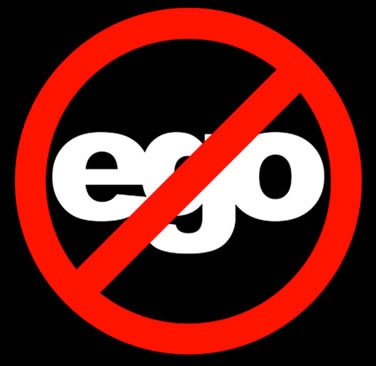
3) And even if we had plenty of experienced, skilled Opticians at the ready, corporate retail interests and their unskilled, inexperienced managers will not allow adequate time and space for appropriate handcrafted skills to be applied at the dispensing table. (As you well know, it takes sufficient time to handcraft eyewear directly on the Patient. Of course, this can be done fairly quickly, but only by skilled and experienced Opticians.) They are too interested in numbers of sales, and serving their stockholders interests ($), at the expense of the consumer, their real base. But serving their Consumer-base is when their stockholders are best served. Too many optical retailers don't get it, in that we are a genuine healthcare industry, and Opticians are Healthcare Professionals dispensing prosthetic devices, not ready-to-wear eyeglass merchants. (I could tell you some really interesting albeit disturbing stories based on my experiences since 1958.)
The task is not impossible and I remain an optimist, but I have not seen anything to indicate we've stopped the rhetoric to the point where we're really getting our 'edge and groove' back. Time is short!
This is the principle, which must be the industry's universal, personal and corporate theme. "Opticianry is ultimately defined by how well the eyewear makes contact with the Patient, not by the number of customers served.” Once adopted, the industry will once again excel in the art form and craft of humanized Opticianry. -- See The Danger Independent Opticians Face.
 And here's a follow up from a senior Optician. And here's a follow up from a senior Optician.
 One thing I have run into is today's optical world only works at the top of the bell curve only being interested in or capable of serving 60% of the eyeglass wearing public. With the rest, it is hit or miss at best. I would say that the new optical people need to understand what an Ultex is and why someone might be wearing one today, how to build a Numount, a Balgrip, or fit an aphakic lenticular. In our one size fits all world, one size really fits about half. You fit a person with an ophthalmic prosthetic so that they can function in their day to day life. That requires a human touch, not a used car salesperson. One thing I have run into is today's optical world only works at the top of the bell curve only being interested in or capable of serving 60% of the eyeglass wearing public. With the rest, it is hit or miss at best. I would say that the new optical people need to understand what an Ultex is and why someone might be wearing one today, how to build a Numount, a Balgrip, or fit an aphakic lenticular. In our one size fits all world, one size really fits about half. You fit a person with an ophthalmic prosthetic so that they can function in their day to day life. That requires a human touch, not a used car salesperson.
 And
this question from another Optician: And
this question from another Optician:
 Why
does it seem this field is always hiring? Are there not enough
opticians here locally? Personally, I think the field is always
hiring because of turnover and lack of significant professional
development opportunities. Any profession that is entered by
way of on-the-job training for low pay does not offer a great
future to many individuals. I think the pay is often too low
for the amount of knowledge required to take care of the patient.
I also think burn out plays a factor. Why
does it seem this field is always hiring? Are there not enough
opticians here locally? Personally, I think the field is always
hiring because of turnover and lack of significant professional
development opportunities. Any profession that is entered by
way of on-the-job training for low pay does not offer a great
future to many individuals. I think the pay is often too low
for the amount of knowledge required to take care of the patient.
I also think burn out plays a factor.
 My six 'sense'. My six 'sense'.
You are correct re the training issue. Wages
are proportionate to the quality and quantity of the services
rendered. The low wages paid to today's Opticians is due to
the steep and steady decline of sufficient application and-or
training in the art form and science of hands on the patient skills,
ergo the inability of most dispensers to deliver adequate
services. One-size-fits-all and dehumanized service reigns
supreme in almost all retail optical venues except for a few
independent, senior Opticians who are fast disappearing. So
much so that consumers now no longer expect or even remember
that hands on the patient service used to be the norm, whereas
their Hairdressers, Manicurists, Dentists, Massage Therapists,
etc., still provide hands-on, touch and feel service, to wit
the optical market has now shifted to the Internet where consumers
suffer from the same dehumanized service, i.e., the absence
of hands on the patient personalized design and customized
fitting of their eyewear, but for less cost. Unfortunately,
the consumer has to then search out old-time, hands on the patient,
touch and feel Opticians for a comfort fitting and-or the
replacement and expense of properly designed and custom fitted
eyewear. Most to no avail.
As we have indicated in previous discussions, the entire industry from State Boards, to optical retailers, to ophthalmic refractionists, i.e., to schools, to frame and lens manufacturers, to optical labs, to dispensing furniture manufacturers, to even the consumers themselves, have all played a part in today's lack of Service. Mostly because we have all failed to demand and require excellence in the manufacturing, fabricating, design and delivery of handcrafted prescription eyewear. Just as in our country's politics, only when we collectively decide the status quo is unacceptable and begin demanding excellence in services will much improvement occur. The causes of the decline in services,
and some remedies are addressed more completely at OpticianryToday.com and OpticalWorkshops.com. See The Danger Independent Opticians Face. See also Service, One-On-One.
Note: Most, if not all States, require Hairstylists, Manicurists, Massage Therapists, etc., to be licensed and regulated.
 From
an optical retail chain operator: From
an optical retail chain operator:
 Having operated over 2200 optical stores in 28 nations, I can state unequivocally that precious few clinicians (Opticians) make good optical store managers. Like it or not, optical retailing is primarily a retail business. There is almost no such thing as a clinician that makes a really effective retailer. Optical retailing is not a hospital. There are no meaningful parallels. Having operated over 2200 optical stores in 28 nations, I can state unequivocally that precious few clinicians (Opticians) make good optical store managers. Like it or not, optical retailing is primarily a retail business. There is almost no such thing as a clinician that makes a really effective retailer. Optical retailing is not a hospital. There are no meaningful parallels.
 My six 'sense'. This statement simply proves our long held point that a profit-driven corporate mindset is at the heart of the steady and steep decline of prescription eyewear delivery skills over the last five decades, i.e., it's just not possible for most corporations, especially those operating 2200 international retail optical outlets, to aptly oversee the Health and Wellness aspects of Opticianry that are necessary for the conscientious dispensing of precision handcrafted prescription eyewear. They have to give their attention to too many economic considerations and other distractions, which obscure their attention to the Health and Wellness elements that define Opticianry. To coin a phrase, selling adversely impacts serving. My six 'sense'. This statement simply proves our long held point that a profit-driven corporate mindset is at the heart of the steady and steep decline of prescription eyewear delivery skills over the last five decades, i.e., it's just not possible for most corporations, especially those operating 2200 international retail optical outlets, to aptly oversee the Health and Wellness aspects of Opticianry that are necessary for the conscientious dispensing of precision handcrafted prescription eyewear. They have to give their attention to too many economic considerations and other distractions, which obscure their attention to the Health and Wellness elements that define Opticianry. To coin a phrase, selling adversely impacts serving.
Again: "Opticianry is ultimately defined by how well the eyewear makes contact with the Patient, not by the number of customers served."
Optical dispensaries, like pharmacies, like it or not, are primarily Health and Wellness facilities. And Opticians, like Pharmacists, like it or not, are primarily Healthcare Providers. In fact, here in Florida, Opticianry falls under the control of the State Department of Health just as does Ophthalmology and Optometry.
Many of today's Retail Optical Execs and Managers have no experience in Opticianry, Ophthalmic Dispensing or even Healthcare. In one national optical outlet, only 1 of 43 Regional Managers is an Optician. You can imagine the adverse impact this practice alone has on the delivery of prescription eyewear. In which region do you think your chances exist of receiving the attention of a skilled Optician? In contrast, the CEO of Walgreens Drugs is a Registered Pharmacist.
There's a long standing conflicted relationship between Professional Opticians and Retail Management, which can be likened to the current relationship between Medical Practitioners and Insurance Industry HMO's. Over the last few decades the dominance of the retail optical paradigm as opposed to the healthcare paradigm has prostituted the practice of Opticianry to the point that independent skilled Opticians have become increasingly difficult to find. And this has contributed greatly to the migration of prescription eyewear consumers to the Internet where the same absence of skilled Eyewear Professionals exists. See More.


 MY VIEWS ON HEALTHCARE IN AMERICA MY VIEWS ON HEALTHCARE IN AMERICA
Check out this news link, first. Then, check our views.
BREAKING NEWS: Medical Care: Nurses, Optometrists Should Not Act As Doctors
VIEWS: For me, the point of this article is silly and conjures up the professional egotism of physicians along with the long standing debate regarding the unacceptably high cost of healthcare in the US, which a) is a fee-based system mostly controlled by physicians and big pharma, and b) limits our current healthcare system to the failed and too costly medicine-practiced-by-doctors-only-fiat paradigm.
How is this working for us? Well, if we saw 200 deaths everyday by way of jetliner crashes for instance, we would unanimously demand changes immediately, but these numbers do not in anyway equal the number of deaths each year due to medical errors under our present MD-controlled healthcare system. Yet, 400,000 annual deaths as of September 2013 (up from 100,000 in 1998) at the hands of this physician-supervised, healthcare-for-profit system gets scant attention by either the public or the media. Why?
I think consumers will benefit greatly when we have more transparency, not less, in our healthcare system. This will foster many more checks and balances. Malpractice and malfeasance will not escape our attention and go unpunished as is so often the current case.
Our healthcare system is under the control of a relatively small and too powerful interest group. Expanding the delivery-of-service base in ophthalmic refracting for instance, will benefit consumers in many ways. After 55 years in my profession, I could tell you some interesting stories.
 How about this? Why is it that when a doctor-refractionist or his staff make an error in producing an eyeglass or contact lens Rx, which is not uncommon, the Optician has to deal with the subsequent consumer negativity, plus cover the cost of the remake? Do you know of any other service where a similar inequity exists? Given the net profit of their practices in comparison with that of most Opticians I know, at the very least the remake COST should be covered by the responsible party. (Change is coming. Want to be a part of it? Contact us here.) How about this? Why is it that when a doctor-refractionist or his staff make an error in producing an eyeglass or contact lens Rx, which is not uncommon, the Optician has to deal with the subsequent consumer negativity, plus cover the cost of the remake? Do you know of any other service where a similar inequity exists? Given the net profit of their practices in comparison with that of most Opticians I know, at the very least the remake COST should be covered by the responsible party. (Change is coming. Want to be a part of it? Contact us here.)
BTW: Whenever we make an error, we are the only accountable party. --


SEND US YOUR COMMENTS HERE. 
Read Me First. 
 LUXOTTICA BUYS U.S. ONLINE RETAILER GLASSES.COM LUXOTTICA BUYS U.S. ONLINE RETAILER GLASSES.COM
Check out this headline, then follow the comments we've received.
BREAKING NEWS: Luxottica setting eye on the online market
 This is certainly an interesting move by Luxottica. The uneasy relationship with independent online retailers may well change given their entry into this marketplace. Whilst the purchase of eyewear will ultimately remain a bricks and mortar proposition in the main, Luxottica have insight into the growth of this market/channel as their brands including Ray Ban Oakley and others are online stars. Its also interesting that they have chosen Glasses.com in part due to their development of a very impressive virtual try on smart phone application. There is much controversy over the genesis of this tool as Ditto.com claims Glasses.com have purchased patents in a 'patent troll' fashion and have essentially copied their technology. Watch this space... This is certainly an interesting move by Luxottica. The uneasy relationship with independent online retailers may well change given their entry into this marketplace. Whilst the purchase of eyewear will ultimately remain a bricks and mortar proposition in the main, Luxottica have insight into the growth of this market/channel as their brands including Ray Ban Oakley and others are online stars. Its also interesting that they have chosen Glasses.com in part due to their development of a very impressive virtual try on smart phone application. There is much controversy over the genesis of this tool as Ditto.com claims Glasses.com have purchased patents in a 'patent troll' fashion and have essentially copied their technology. Watch this space...
 Phooey! I think we do not give the public enough credit for common sense. My experience is that online purchasing is really not affecting practices so much, in fact many people who have tried it are now coming in having had bad experiences. Sure, some people will go there, but to think that it will take over the entire retail aspect or a large portion of it is insane. People want a personal hands-on experience when it comes to eyewear. Its up to Opticians to educate and reinforce the greater advantages, shopping experience, and back up there is to be had by visiting your local Optometrist or Optician. Phooey! I think we do not give the public enough credit for common sense. My experience is that online purchasing is really not affecting practices so much, in fact many people who have tried it are now coming in having had bad experiences. Sure, some people will go there, but to think that it will take over the entire retail aspect or a large portion of it is insane. People want a personal hands-on experience when it comes to eyewear. Its up to Opticians to educate and reinforce the greater advantages, shopping experience, and back up there is to be had by visiting your local Optometrist or Optician.
 So we all knew they were going to do something big in online sales, and they did. There is a way forward to compete with this, just don't have the answers right now, today. I think the first question is: Can an independent practice survive over the next twenty years without going online? Once you know the answer to that question, then you will find the answer to the bigger question of how. So we all knew they were going to do something big in online sales, and they did. There is a way forward to compete with this, just don't have the answers right now, today. I think the first question is: Can an independent practice survive over the next twenty years without going online? Once you know the answer to that question, then you will find the answer to the bigger question of how.
 I certainly wouldn't buy dentures online and I cringe when I hear of "old enough to know better" people ordering glasses online. It seems odd to me that on the one hand we have Luxottica/Lenscrafters saying that their glasses are returnable after their staff takes any required measurements, and now offering glasses where the customer takes their own measurements. I certainly would not like to work for a company that wants to eliminate the importance of the service that Opticians provide. I certainly wouldn't buy dentures online and I cringe when I hear of "old enough to know better" people ordering glasses online. It seems odd to me that on the one hand we have Luxottica/Lenscrafters saying that their glasses are returnable after their staff takes any required measurements, and now offering glasses where the customer takes their own measurements. I certainly would not like to work for a company that wants to eliminate the importance of the service that Opticians provide.
 Online purchases are going to grow. Just like contact lenses...people will still come in and get an exam, and a pair, but that "second cheap spare pair" will more and more be bought online. Online purchases are going to grow. Just like contact lenses...people will still come in and get an exam, and a pair, but that "second cheap spare pair" will more and more be bought online.
 My six 'sense'. This Luxottica news is not surprising. It continues the decades-old and ever-increasing prostitution of Opticianry. As an Optician of 56 years, and one of only a few remaining 'old school' hands-on the patient Opticians who teaches the art, this is my advice to any Optician, and especially those who are considering Opticianry as a career. My six 'sense'. This Luxottica news is not surprising. It continues the decades-old and ever-increasing prostitution of Opticianry. As an Optician of 56 years, and one of only a few remaining 'old school' hands-on the patient Opticians who teaches the art, this is my advice to any Optician, and especially those who are considering Opticianry as a career.
Eyeglass Consumers need and deserve the following:
a) Optician-assisted, in-depth lifestyle interview;
b) Optician-assisted, design and selection;
c) HANDCRAFTED, FORM-FITTING EYEWEAR;
d) Free lifetime adjustments and minor repair services...NONE OF WHICH ARE AVAILABLE ONLINE. See 3DDispensing.com and DispensingGuidelines.com.
Until our industry acts collectively to get back to putting Hands-on-the-Consumer Service first there's no certification or licensure that can save us. PRACTICAL HANDS-ON TRAINING IS OUR ONLY JOB SECURITY.
Questions:
1) Do you consider prescription eyewear to be medical devices, which require precisely crafted fit and finish for your full-time comfort and wearability?
2) Do you consider dentures to be medical devices, which require precisely crafted fit and finish for your full-time comfort and wearability?
3) Would you consider purchasing such devices online?
4) If so, how or where will you acquire replacement, repair and-or adjustment services? See TimeForCraftsmanship.com. See Glasses Online Warning. See 3DDispensing.com. See DispensingGuidelines.com. See Serving Versus Selling. Stay tuned.
 The question is whether they will finally rule the eyewear industry through their continuous purchasing of companies, frame designers and manufacturers etc. If we really do understand the importance and value of independent eyewear professionals whose approach and selection are far different than the big box folks, and certainly the on-line crazies,and if we try and support these people in all that they do, including opticians of longstanding (you for 56 years - wow!) and offer something different and exciting, will we not be certain of a place in this industry for a long time in to the future? Small towns in Canada rued the day Walmart and expanded grocery stores took over the community and put small businesses to flight. Yet now see the reverse happening as small stores or small franchises like Cobbs bread stores come back in and find a niche and a living in these towns, because people want something special and different, and I really think they want a warm body to relate to when it comes to making their purchases. The question is whether they will finally rule the eyewear industry through their continuous purchasing of companies, frame designers and manufacturers etc. If we really do understand the importance and value of independent eyewear professionals whose approach and selection are far different than the big box folks, and certainly the on-line crazies,and if we try and support these people in all that they do, including opticians of longstanding (you for 56 years - wow!) and offer something different and exciting, will we not be certain of a place in this industry for a long time in to the future? Small towns in Canada rued the day Walmart and expanded grocery stores took over the community and put small businesses to flight. Yet now see the reverse happening as small stores or small franchises like Cobbs bread stores come back in and find a niche and a living in these towns, because people want something special and different, and I really think they want a warm body to relate to when it comes to making their purchases.
 ...you are correct on so many levels. There was no move to stop this in Canada either. I had discussions on blogs with prominent international chain owners in the past, who said that this was in fact an oligopoly and so escapes government ridicule. Whatever the semantics, the fact is, they have a huge piece of the pie. However, their modus operandi could be their worst enemy. Making cheap frames in Weng Zhou, lacking on so many fronts in retail (read blogs) and being hard to deal with from the perspective of the few stores that continue to "have to have their brands" on a wholesale purchase level. ...you are correct on so many levels. There was no move to stop this in Canada either. I had discussions on blogs with prominent international chain owners in the past, who said that this was in fact an oligopoly and so escapes government ridicule. Whatever the semantics, the fact is, they have a huge piece of the pie. However, their modus operandi could be their worst enemy. Making cheap frames in Weng Zhou, lacking on so many fronts in retail (read blogs) and being hard to deal with from the perspective of the few stores that continue to "have to have their brands" on a wholesale purchase level.
 I think it's just another reason any right-minded Optician would never order from Luxottica, much less work for them. I think it's just another reason any right-minded Optician would never order from Luxottica, much less work for them.
 I also agree. I will continue to do the very best I can for every single patient, including selling the best possible products at prices that are reasonable for the consumer. I've been at this for 37 years, because I like the personal contact and ability to make people happy. And I'll avoid any cpmpany that gets in bed with Luxottica, especially a European lens company. I also agree. I will continue to do the very best I can for every single patient, including selling the best possible products at prices that are reasonable for the consumer. I've been at this for 37 years, because I like the personal contact and ability to make people happy. And I'll avoid any cpmpany that gets in bed with Luxottica, especially a European lens company.
 I do believe that Luxottica will continue to gain market share. The FTC is responsible for policing monopolies, and has done a horrible job the last 20 years. My understanding is that monopoly exists when a company has more than 51% of a market. I recently read that Luxottica has over 70% in the U.S. Our government has betrayed us on this and other monopoly businesses. It's a sad day, but it's the reality. I do believe that Luxottica will continue to gain market share. The FTC is responsible for policing monopolies, and has done a horrible job the last 20 years. My understanding is that monopoly exists when a company has more than 51% of a market. I recently read that Luxottica has over 70% in the U.S. Our government has betrayed us on this and other monopoly businesses. It's a sad day, but it's the reality.
 70% sounds incredibly high. I do think that one reason they will avoid any sanctions irrespective of share of wholesale market is that they will not be crossing over to optical lens or contact lens manufacture. 70% sounds incredibly high. I do think that one reason they will avoid any sanctions irrespective of share of wholesale market is that they will not be crossing over to optical lens or contact lens manufacture.
 The natural evolutionary development of the optical retail market continues. Luxottica moving into on-line is just natural -- should not surprise anyone. Traditionalists in the optical retail market are not going to change any of this. The smart players will find a way to move with the evolutionary development, not moan and groan about it. The natural evolutionary development of the optical retail market continues. Luxottica moving into on-line is just natural -- should not surprise anyone. Traditionalists in the optical retail market are not going to change any of this. The smart players will find a way to move with the evolutionary development, not moan and groan about it.
 Indeed, though what exactly is traditional any more. Some would say that 1-hour service is traditional and that click and collect is the future. Perhaps Luxottica will integrate glasses.com with Lenscrafters and produce some synergy in that way. Indeed, though what exactly is traditional any more. Some would say that 1-hour service is traditional and that click and collect is the future. Perhaps Luxottica will integrate glasses.com with Lenscrafters and produce some synergy in that way.
 My six 'sense'. My six 'sense'.
To the two uninformed and obviously unskilled authors above: Either you do not wear prescription eyewear, and-or know nothing about the art form and craft of dispensing eyewear, and-or are untrained Luxottica merchants-distributors. Again, Opticianry is ultimately defined by how well the eyewear makes contact with the Patient... Many
optical outlets, including online merchants, employ unskilled dispensers. This environment has prostituted the practice of Opticianry.
Questions:
1) Do you consider prescription eyewear to be medical devices, which require precisely crafted fit and finish for your full-time comfort and wearability?
2) Do you consider dentures to be medical devices, which require precisely crafted fit and finish for your full-time comfort and wearability?
3) Would you consider purchasing such devices online?
4) If so, how or where will you acquire replacement, repair and-or adjustment services?


See TimeForCraftsmanship.com. See Glasses Online Warning. See What Is 3D Dispensing? See DispensingGuidelines.com. See Serving Versus Selling. See Online Glasses Not What Doctor Ordered. See Notice To Consumers Regarding Guidelines. See To Serve Is To Succeed. Stay tuned. |
